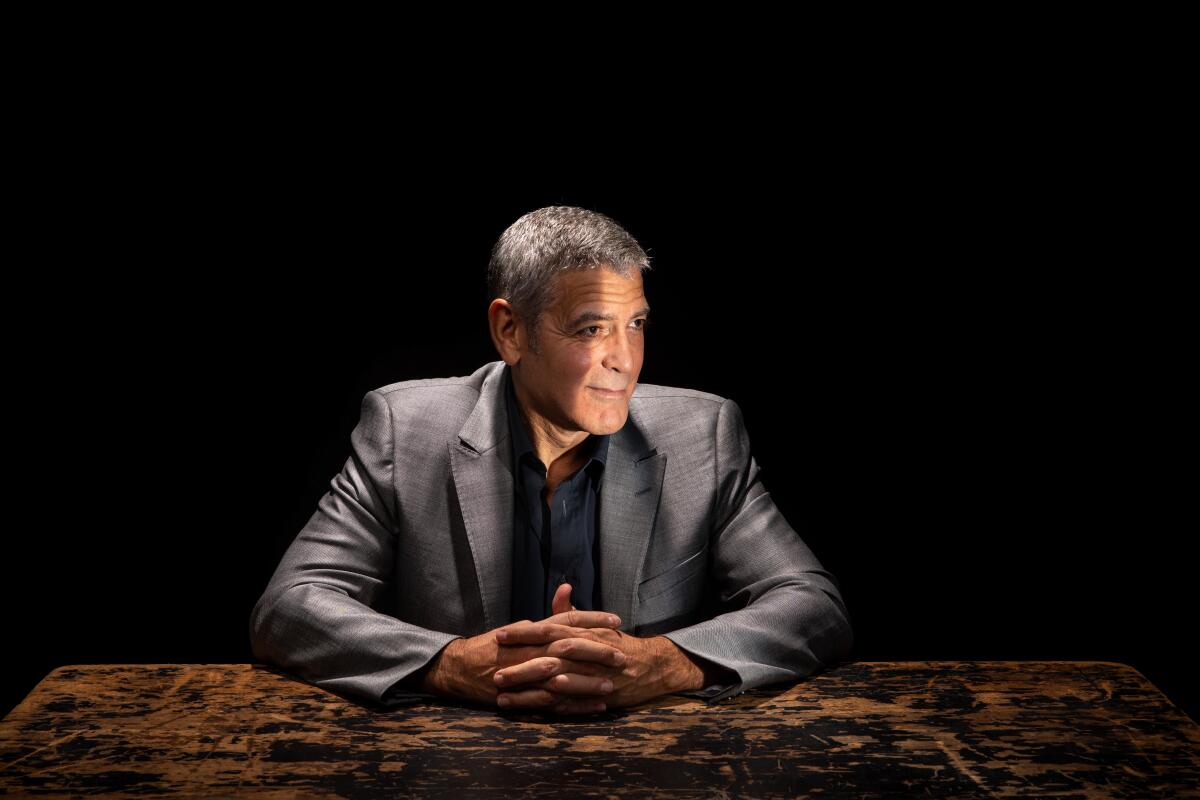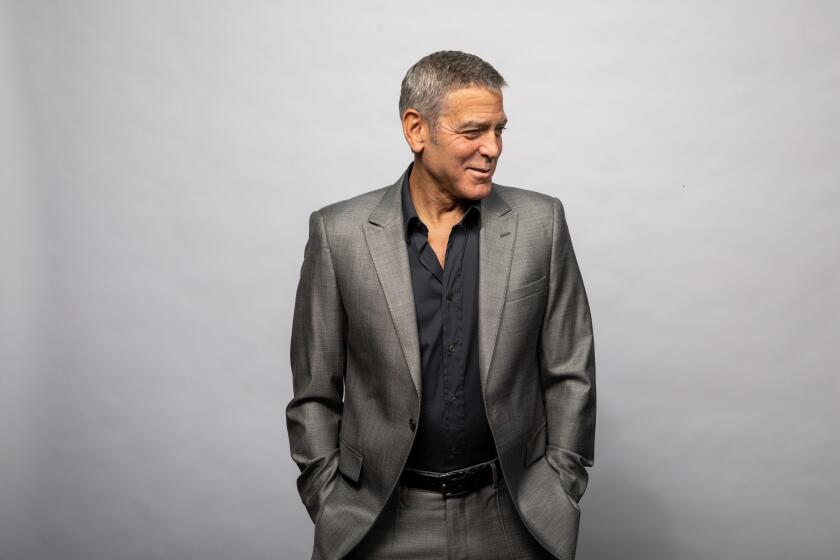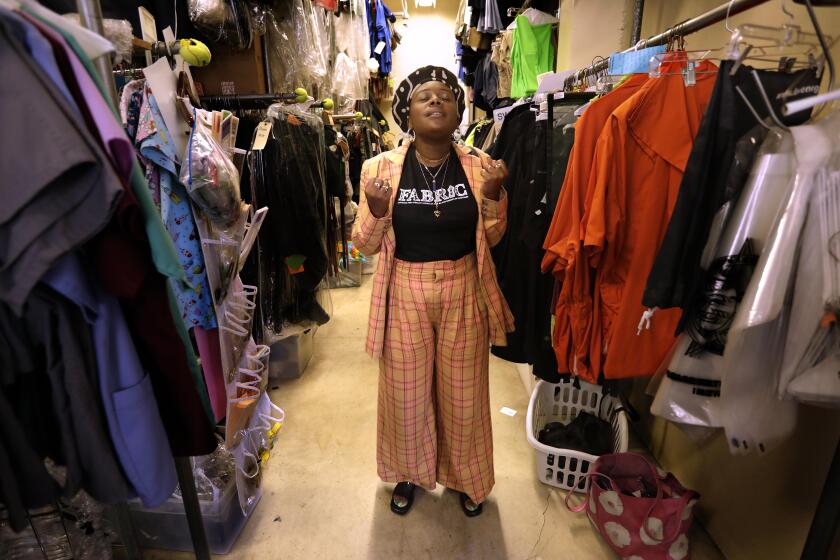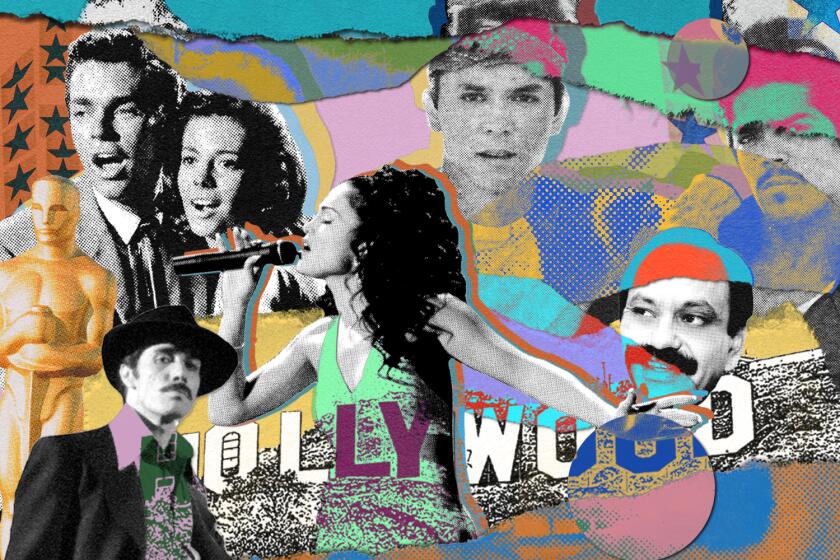Why George Clooney pushed for a new L.A. public school to train movie and TV crews

Last year, George Clooney pushed an idea that could help make Hollywood production crews more diverse.
That dream became a reality this year in the Roybal School of Film and Television Production Magnet, which opened last month with 150 ninth- and 10th-grade students in the Los Angeles Unified School District.
The magnet school in downtown L.A., housed within the Edward R. Roybal Learning Center, aims to build a pipeline of students from underrepresented backgrounds who are interested in entertainment but may lack the opportunity to break into well-paid union jobs on film sets such as camera operators, set decorators and makeup artists.
âItâs like training to be a doctor. Youâre going to learn a trade [and] if you work and get good at your trade, there will be jobs for you,â Clooney said in an interview. âWeâre in desperate need of workers.â
He and other celebrities, including Mindy Kaling and Don Cheadle, were set to join L.A. Unified Supt. Alberto M. Carvalho at a press event Wednesday to mark the schoolâs debut.
âWhen our children are left out, the adults who they should become and will become will never have the opportunity they should,â said Carvalho, speaking to students at an assembly marking the official opening. âTalent is equally distributed. Opportunity is not. And that makes a difference.â
The effort comes as Hollywood has faced criticism that it remains too white and male. Several companies have vowed over the years to diversify their staffs and publicly release their racial demographics to hold themselves accountable for change, but the industry has struggled to diversify its ranks, especially among film crews. The school is among several initiatives backed by studios and filmmakers to address the problem.
For the record:
1:39 p.m. Sept. 14, 2022This story was updated to correct a quote by George Clooney on the schoolâs training.
The Times spoke with Clooney, producer-actor-writer-director Grant Heslov and Creative Artists Agency Co-Chairman Bryan Lourd, who established the Roybal Film and Television Production Magnet Fund, which raised more than $4 million for the school.
The fundâs founding partners include Amazon Studios, Walt Disney Co., Fox Corp., NBCUniversal/Telemundo Enterprises, Netflix, Paramount, Sony Pictures Entertainment, the History Channel/A&E Networks and Warner Bros. Discovery. The schoolâs board members include Kaling, Kerry Washington and Eva Longoria.
The conversation has been edited for brevity and clarity.
Creative Artists Agency and a group of filmmakers such as George Clooney are creating an L.A. magnet school to help train high schoolers for jobs on movie and TV sets.
What inspired you to push for this school now?
Clooney: When youâre directing or producing a film, one of your goals is to make sure youâre covering the fabric of the American culture. We find ourselves constantly trying to fill in at the wrong end. Weâre trying to fix a problem, which clearly since the inception of our industry has done a pretty poor job of.
Grant and I started to talk about it. Whatâs a way we could fix this? We talked with a friend of ours, Eric Fellner, who runs Working Title in London, and he said he started a school for older kids. And I said, why donât we have a school like that in Los Angeles, the heartbeat of Hollywood? Itâs just insane. We should start earlier, in high school.
The basic idea is that thereâs all these jobs that are available. There are 65,000 below-the-line jobs in the United States. These kids going into Roybal, 90% are [living] below the poverty line. They donât know these jobs exist. They donât know [how] to pursue them. Why arenât we attacking this problem early on?
So I called up Bryan [Lourd] and I said, âHow can we do this? How can we start a school?â Listen, Iâm an actor and I didnât finish college, so education is something you wouldnât necessarily attach with me.
Lourd: Austin Beutner [former L.A. Times publisher], at the time, who was the head of LAUSD, was someone that I had worked with on various initiatives in the school district. I called [in June 2021] and said, âThereâs this idea and George, Grant and I want to help if we can,â and he said, âIf you can pull together the right board and commit to this, I can get you a school, and we can cut through the red tape and we can go to work on it right away.â
Careers in the entertainment industry can be mysterious for those just starting out, and even for those working in the business. The Los Angeles Times brings you explainers and advice for starting and building your career in Hollywood.
How will you measure the success of the school?
Heslov: We want kids to be able to have the opportunity â if theyâre interested â to go straight from the curriculum into work, to well-paying jobs. If we can get one kid graduating into the business and keep following that up, to me thatâs success.
When I really know weâve been successful is when George and I go to cast up our movie, and weâre able to hire kids who have come through our training program, and be able to fill those jobs, which frankly right now we canât fill.
Clooney: Itâs important to understand that we donât know if it will work. Weâre taking a shot at this. We believe itâll work.
We went to everybody, every single studio, and we hit them up and said, âWe want money, but more than that, we want your participation.â The first studio we hit up, they said, âWeâll pay for the whole thing.â Weâre like, âIt canât be [just] you, it has to be everybody.â The participation has to mean apprenticeships and internships, and this has to lead to jobs for these kids. That also means getting your editor or cinematographer that is going to teach. We also had to have buy-in from the union.
We needed everybody in on this so that you could stand up and say, we recognize there is a problem. We also recognize that if we can fix it, if this works in three years, then you could do this in Atlanta, New York and Chicago. Thereâs nothing that could stop this thing from really changing the dynamics.
Motion picture costumers launched a diversity committee to help support members of color. But committee members ended up resigning in frustration.
What steps will the school take to give full-time jobs in the industry to students ? Is there a long-term commitment from partners to offer a set number of internships to students?
Lourd: Many people are working on great programs. What was missing was 9-toâ12[th grade] chapter of this. That was them crossing their fingers and hoping that graduates, or people entering the job market, would find their way to the right union or to the right apprenticeships. Thatâs what Grant and George were referring to, that there just arenât that many people that are well trained, that know how to get into the industry.
So the simplest hope in this curriculum that we built is that theyâll graduate with a degree from high school. Theyâre going to take all the normal courses that you have to take to get to it, but theyâll be specializing [in] these areas that are below the line [behind the camera], ranging from hair and makeup to editing, costume, lighting, all the categories. The plan is if you graduate or if you get into this program, that weâll be able to place every single one of them that wants to work.
Hollywoodâs history with Latino representation is a muddy mess. Why even Washington politicians are taking action.
Clooney: After four years at that school, you get a diploma, you want to go to college, go to college. Itâs just like a normal high school, but itâs also a trade school, so youâre going to be able to home in on something that really attracts you. Look, youâre not going to come out of high school and start as a department head, right? Youâre going to start at the bottom like everybody does, but youâre going to have such a giant leap ahead of everyone else. Youâre going to have incentive from all of the studios who have buy-in on this, not just financial, but all of it to make sure this works.
What steps will the school take in ensuring that these crew jobs provide a livable wage and arenât just a pipeline of unpaid diversity hires?
Clooney: I think if youâre in the union, youâre getting paid at a fairly decent clip. So for the union jobs, weâre focusing on making sure that the unions help us out, because itâs going to be some effort from them along the way because thereâs some things theyâre going to have to help us do to get these kids in. Thatâs sort of the reason we were doing this also is because you can find people to do the jobs that nobody pays. What we want is it to [have] decent paying jobs quickly.
Times Staff Writer Howard Blume contributed to this report.
More to Read
Inside the business of entertainment
The Wide Shot brings you news, analysis and insights on everything from streaming wars to production â and what it all means for the future.
You may occasionally receive promotional content from the Los Angeles Times.















